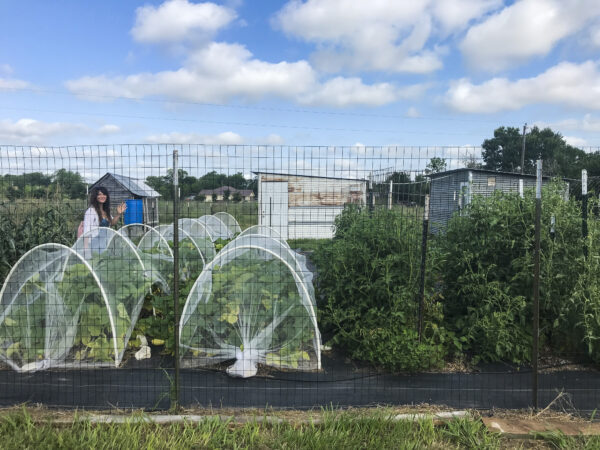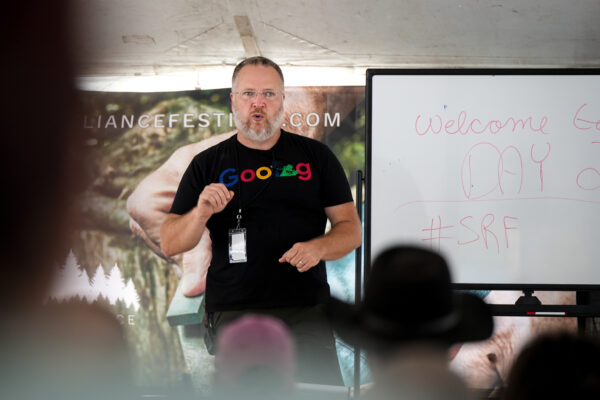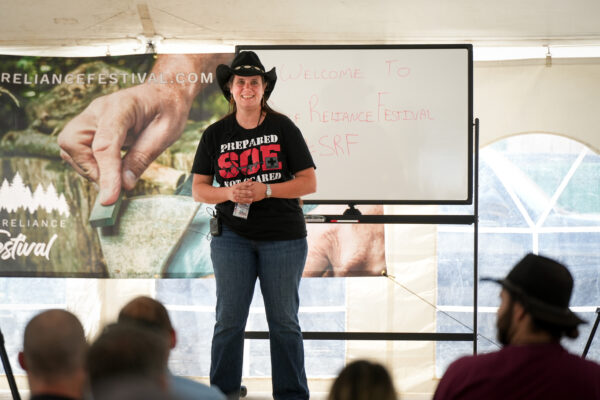CAMDEN, Tenn.—John Willis spent about 10 years living in the backwoods waiting for society to collapse. It didn’t.
Article by Charlotte Cuthbertson from our premium news partners at The Epoch Times.
“I think a lot of people forget to live because you’re waiting for society to collapse,” Willis said during a Self-Reliance Festival in Tennessee recently. “I spent a lot of years in a cave, doing absolutely nothing.”
He said he emerged still owing the IRS $3.2 million and ready to try a new approach to life. Now (after paying back the IRS), he’s part of a larger community of people in Tennessee and beyond who are moving toward a lifestyle that can mostly operate outside of government vagaries.
Modern-day prepping builds on a lot more than the panicked reaction of isolating yourself or frantically squirreling away beans, bullets, and bandaids. It’s an intentional shift toward living a more traditional, self-sufficient, and responsible lifestyle.
“Preparedness is not a big pile of stuff in the basement. That’s a good piece of preparedness. But that’s like, everything else has failed so now I’m going to rely on my stockpile,” said Jack Spirko, one of the more well-known preppers. Spirko hosts The Survival Podcast, with the tagline: “Helping you live a better life, if times get tough or even if they don’t.”
The combination of the government-imposed lockdowns during the COVID-19 pandemic and resultant panic-buying, the Black Lives Matter riots in 2020, and the 2020 election spurred a lot of Americans into making their household more resilient financially, as well as with food, water, and other essentials.
Since then, a litany of added pressures are affecting people’s daily lives, including supply chain issues, food crop losses, food production plant destruction, fertilizer shortages, increased gas prices, and inflation. Natural disasters, job losses, and health issues are ongoing potential curveballs to prepare for.
But, it needs to be a rational, step-by-step process, the experts say.

“I think probably the biggest mistake most preppers are making … is y’all are full of too much anxiety. Way too much anxiety—you’re worried about everything,” TJ Morris said in Tennessee.
“You should let that anxiety spur you to action, and then become emotionally detached from the execution portion of it. Just do it.”
Morris, who goes by Bear Independent online, has a 28-episode Prepper Classroom series on YouTube that logically explains the fundamentals of prepping and provides a how-to guide. His food prepping video details amounts, based on calorie intake, including that each adult needs 750 pounds of dried grains per year.
Morris said he worked with FEMA for 10 months after Hurricane Katrina from the Florida Keys up to east Texas.
“There’s a lot of people right now who think the government’s going to come save you. And there’s a lot of people who think the government is going to come and enslave you. I’m here to tell you, they’re not coming. They’re just not coming. It’s not happening.”
He’s spent the last several years building his own resilient homestead as well as a strong community of people who are willing to help each other.
Spirko’s first piece of advice is for people to strengthen the financial side of their lives.
“That’s the thing that’s going to hit you first,” he said. Diversify your money sources, start a side business using social media as an advertising platform, and look for bartering options in your community.
“And then as far as food preparation, get yourself a sheet of paper … and keep a food diary. Everything in there that you can store, start stacking that,” Spirko said. Aside from increasing pantry size, home gardens have become one of the most popular ways people have responded to food pressures. He said his biggest mistake was trying to do everything at once.
Joel Skousen, author of several books about strategic relocation and securing your home, has published a basic booklet called “10 Packs for Survival,” in which he lists the essential items within the 10 categories of food, water, power, medical, transport, travel, communications, equipment, defense, and tools.
Don’t wait for a stock market crash, dedollarization, or CBDCs before securing your retirement with physical precious metals. Genesis Gold Group can help.

Nicole Sauce, who is known for her podcast, Living Free in Tennessee, has helped bring like-minded people together in person and on messaging apps such as Telegram in their local areas. She’s a big advocate of building community and commerce networks.
“Relationships are very commerce related,” she said. “So when we talk about underground networking, we’re also talking about … doing commerce with each other. And you know what happens when this gets bigger and bigger and bigger? Do we care if the economy crashes at that point?”
Recently, Sauce posted a message in her local Facebook group asking if anyone was interested in going in together to buy and butcher a cow. Within a few days, enough people had joined in and they filled their freezers with cuts of local beef.
She works together with her immediate neighbors on “projects like grazing sheep, freezing bunnies, fixing each other’s things that go wrong.”
Sauce also advises against pushing people away who don’t share the preparedness mindset.
“If your response is to withdraw from your friends and your family who don’t get it—guys, there will always be people in your life who don’t get it—and if you withdraw from them, they’re going to not get it for longer,” she said.
“If you are an empowering presence in their life, and if you just model a prepared, logical, stable, ‘building the life I want’ … every so often, a light bulb goes on.”

She shared a story about her non-prepper sister in California who called her as wildfires threatened to encroach on her home. Sauce said she suggested storing as much water as possible in containers, the bath, and the hot tub and once the emergency was over, they could discuss a less last-minute, panicked approach.
Adding an extra 5-gallon can of gas to your inventory each week, or even each month, can help alleviate a situation. A resident in Louisiana last year had her car packed ready to drive to Texas after a hurricane, but the tank was empty and the gas stations for miles around were either out or had hours-long waits. She was forced to stay in her home with no electricity and no running water.
It’s better to make decisions about what you’re preparing for and how to prepare based on your family, location, and budget before an emergency hits, the experts say. Do you need to prepare for electricity outages? Food shortages? A hurricane? Economic collapse? Job loss? Political or civil unrest?
Building community and decreasing dependency on the large, corporate systems can help to alleviate problems.
Suggestions on how to build a community include going to a local farmer’s market, meeting your neighbors, joining a club, a social media group, or a community garden.
Image via Shutterstock.
Five Things New “Preppers” Forget When Getting Ready for Bad Times Ahead
The preparedness community is growing faster than it has in decades. Even during peak times such as Y2K, the economic downturn of 2008, and Covid, the vast majority of Americans made sure they had plenty of toilet paper but didn’t really stockpile anything else.
Things have changed. There’s a growing anxiety in this presidential election year that has prompted more Americans to get prepared for crazy events in the future. Some of it is being driven by fearmongers, but there are valid concerns with the economy, food supply, pharmaceuticals, the energy grid, and mass rioting that have pushed average Americans into “prepper” mode.
There are degrees of preparedness. One does not have to be a full-blown “doomsday prepper” living off-grid in a secure Montana bunker in order to be ahead of the curve. In many ways, preparedness isn’t about being able to perfectly handle every conceivable situation. It’s about being less dependent on government for as long as possible. Those who have proper “preps” will not be waiting for FEMA to distribute emergency supplies to the desperate masses.
Below are five things people new to preparedness (and sometimes even those with experience) often forget as they get ready. All five are common sense notions that do not rely on doomsday in order to be useful. It may be nice to own a tank during the apocalypse but there’s not much you can do with it until things get really crazy. The recommendations below can have places in the lives of average Americans whether doomsday comes or not.
Note: The information provided by this publication or any related communications is for informational purposes only and should not be considered as financial advice. We do not provide personalized investment, financial, or legal advice.
Secured Wealth
Whether in the bank or held in a retirement account, most Americans feel that their life’s savings is relatively secure. At least they did until the last couple of years when de-banking, geopolitical turmoil, and the threat of Central Bank Digital Currencies reared their ugly heads.
It behooves Americans to diversify their holdings. If there’s a triggering event or series of events that cripple the financial systems or devalue the U.S. Dollar, wealth can evaporate quickly. To hedge against potential turmoil, many Americans are looking in two directions: Crypto and physical precious metals.
There are huge advantages to cryptocurrencies, but there are also inherent risks because “virtual” money can become challenging to spend. Add in the push by central banks and governments to regulate or even replace cryptocurrencies with their own versions they control and the risks amplify. There’s nothing wrong with cryptocurrencies today but things can change rapidly.
As for physical precious metals, many Americans pay cash to keep plenty on hand in their safe. Rolling over or transferring retirement accounts into self-directed IRAs is also a popular option, but there are caveats. It can often take weeks or even months to get the gold and silver shipped if the owner chooses to close their account. This is why Genesis Gold Group stands out. Their relationship with the depositories allows for rapid closure and shipping, often in less than 10 days from the time the account holder makes their move. This can come in handy if things appear to be heading south.
Lots of Potable Water
One of the biggest shocks that hit new preppers is understanding how much potable water they need in order to survive. Experts claim one gallon of water per person per day is necessary. Even the most conservative estimates put it at over half-a-gallon. That means that for a family of four, they’ll need around 120 gallons of water to survive for a month if the taps turn off and the stores empty out.
Being near a fresh water source, whether it’s a river, lake, or well, is a best practice among experienced preppers. It’s necessary to have a water filter as well, even if the taps are still working. Many refuse to drink tap water even when there is no emergency. Berkey was our previous favorite but they’re under attack from regulators so the Alexapure systems are solid replacements.
For those in the city or away from fresh water sources, storage is the best option. This can be challenging because proper water storage containers take up a lot of room and are difficult to move if the need arises. For “bug in” situations, having a larger container that stores hundreds or even thousands of gallons is better than stacking 1-5 gallon containers. Unfortunately, they won’t be easily transportable and they can cost a lot to install.
Water is critical. If chaos erupts and water infrastructure is compromised, having a large backup supply can be lifesaving.
Pharmaceuticals and Medical Supplies
There are multiple threats specific to the medical supply chain. With Chinese and Indian imports accounting for over 90% of pharmaceutical ingredients in the United States, deteriorating relations could make it impossible to get the medicines and antibiotics many of us need.
Stocking up many prescription medications can be hard. Doctors generally do not like to prescribe large batches of drugs even if they are shelf-stable for extended periods of time. It is a best practice to ask your doctor if they can prescribe a larger amount. Today, some are sympathetic to concerns about pharmacies running out or becoming inaccessible. Tell them your concerns. It’s worth a shot. The worst they can do is say no.
If your doctor is unwilling to help you stock up on medicines, then Jase Medical is a good alternative. Through telehealth, they can prescribe daily meds or antibiotics that are shipped to your door. As proponents of medical freedom, they empathize with those who want to have enough medical supplies on hand in case things go wrong.
Energy Sources
The vast majority of Americans are locked into the grid. This has proven to be a massive liability when the grid goes down. Unfortunately, there are no inexpensive remedies.
Those living off-grid had to either spend a lot of money or effort (or both) to get their alternative energy sources like solar set up. For those who do not want to go so far, it’s still a best practice to have backup power sources. Diesel generators and portable solar panels are the two most popular, and while they’re not inexpensive they are not out of reach of most Americans who are concerned about being without power for extended periods of time.
Natural gas is another necessity for many, but that’s far more challenging to replace. Having alternatives for heating and cooking that can be powered if gas and electric grids go down is important. Have a backup for items that require power such as manual can openers. If you’re stuck eating canned foods for a while and all you have is an electric opener, you’ll have problems.
Don’t Forget the Protein
When most think about “prepping,” they think about their food supply. More Americans are turning to gardening and homesteading as ways to produce their own food. Others are working with local farmers and ranchers to purchase directly from the sources. This is a good idea whether doomsday comes or not, but it’s particularly important if the food supply chain is broken.
Most grocery stores have about one to two weeks worth of food, as do most American households. Grocers rely heavily on truckers to receive their ongoing shipments. In a crisis, the current process can fail. It behooves Americans for multiple reasons to localize their food purchases as much as possible.
Long-term storage is another popular option. Canned foods, MREs, and freeze dried meals are selling out quickly even as prices rise. But one component that is conspicuously absent in shelf-stable food is high-quality protein. Most survival food companies offer low quality “protein buckets” or cans of meat, but they are often barely edible.
Prepper All-Naturals offers premium cuts of steak that have been cooked sous vide and freeze dried to give them a 25-year shelf life. They offer Ribeye, NY Strip, and Tenderloin among others.
Having buckets of beans and rice is a good start, but keeping a solid supply of high-quality protein isn’t just healthier. It can help a family maintain normalcy through crises.
Prepare Without Fear
With all the challenges we face as Americans today, it can be emotionally draining. Citizens are scared and there’s nothing irrational about their concerns. Being prepared and making lifestyle changes to secure necessities can go a long way toward overcoming the fears that plague us. We should hope and pray for the best but prepare for the worst. And if the worst does come, then knowing we did what we could to be ready for it will help us face those challenges with confidence.





